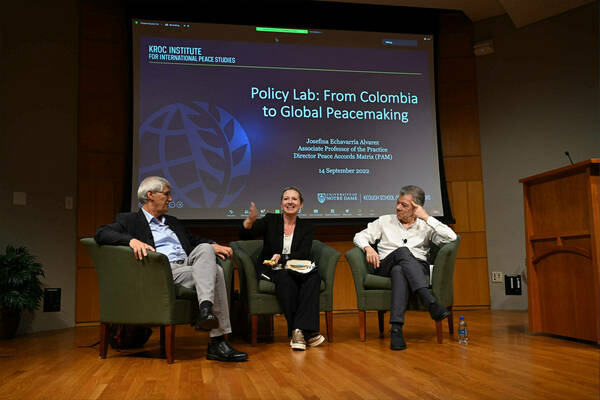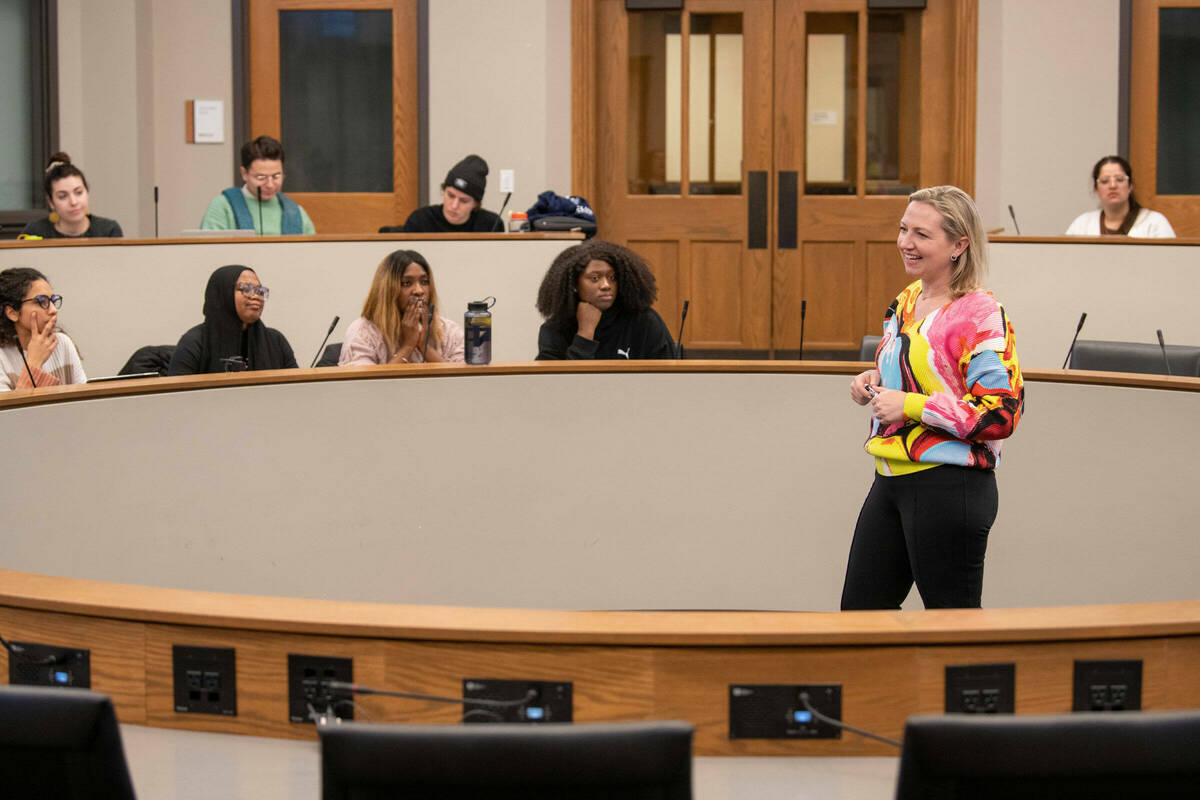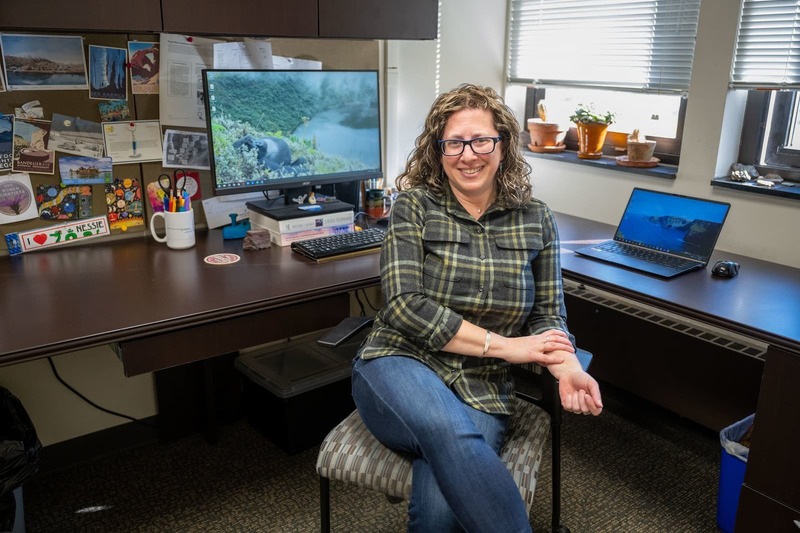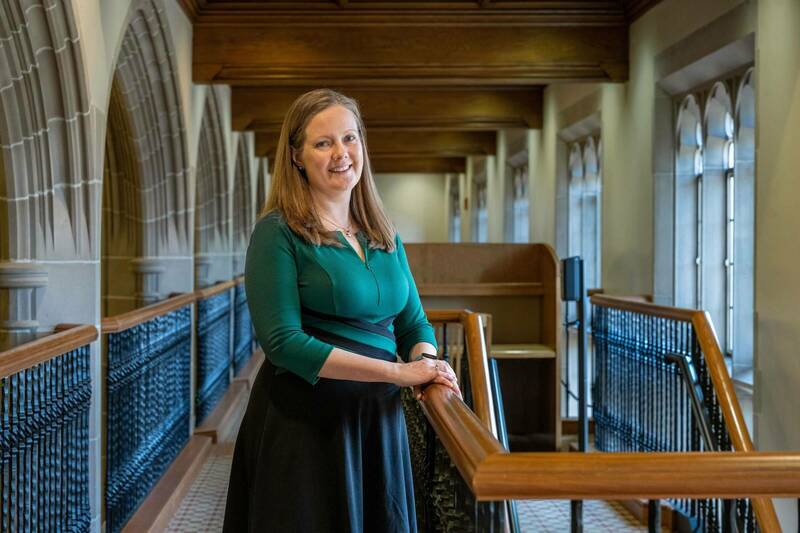At first glance, peace seems like a noble but nebulous concept — worth aspiring to, but difficult to attain. Yet researchers who specialize in peace studies can identify specific strategies that reduce violent conflict and particular conditions that engender just and peaceful societies. Josefina Echavarría Alvarez, director of the Peace Accords Matrix at Notre Dame, is a leading expert in this area.
Since 2020, Echavarría Alvarez has led a team of more than 40 researchers in Colombia and the United States who have been charged with the technical verification and monitoring of the implementation of the 2016 Colombian Peace Agreement in real time. Signed on Nov. 24, 2016, by Colombian President Juan Manuel Santos and the Revolutionary Armed Forces of Colombia (FARC-EP), the peace accord is celebrated as a turning point in a civil war lasting more than 50 years.

For Echavarría Alvarez, Colombia’s civil war is a primary research interest and a critical part of her personal history. Growing up in Medellín, the second-largest city in Colombia after Bogotá, Echavarría Alvarez often witnessed kidnappings, murders and terrorist attacks. Curfews and bomb threats marked daily life, and her family moved around the city and the country multiple times to stay safe.
“Growing up during the war shaped who I am in a profound way,” Echavarría Alvarez said. “Not just my work but my way of being in the world. I was surrounded by violence and lived against the backdrop of an unequal society. Resources were distributed in ways that led me to think deeply about justice and also very much about peace.”
After college, Echavarría Alvarez began a career in the development sector, focusing on channeling potable water to rural communities. Working on projects funded by the World Bank and the United Nations Development Programme, she learned to actively listen to community members to understand their needs. Her experiences were eye-opening, she said, piquing her interest in peacebuilding and compelling her to learn more.
“I began to understand the connections between development and peacebuilding, and realized that the roots of many episodes of violence have to do with the way we conceive of flourishing and community.”
“I began to understand the connections between development and peacebuilding, and realized that the roots of many episodes of violence have to do with the way we conceive of flourishing and community,” she said.
Graduate studies led Echavarría Alvarez to Austria, where she earned a master’s degree in peace studies at the University of Innsbruck, and then to Spain, where she graduated from the Universitat Jaume I in Castello with a doctorate in peace, conflict and democracy.
Echavarría Alvarez became interested in Notre Dame after attending a 2018 summer peacebuilding institute at the Kroc Institute for International Peace Studies, part of the Keough School of Global Affairs and home to the Peace Accords Matrix (PAM), a database on the implementation of 34 comprehensive peace agreements negotiated between 1989 and 2012. Since 2020, she has led both PAM and its Barometer Initiative, the entity that monitors the implementation of the Colombian Peace Accord.
The Colombian Peace Accord is unique because of its comprehensive nature, Echavarría Alvarez said. It is designed not only to stop immediate violence between conflict parties, but also to examine deeper questions about what lies behind the violence — questions of land ownership, for example, and the rights of Indigenous communities. Equally important is a transitional justice system that prosecutes perpetrators but also prioritizes humanitarian efforts to locate more than 120,000 disappeared people.
“An approach to justice that is truly restorative doesn’t just seek to sanction the perpetrators,” Echavarría Alvarez said. “It seeks to heal the victims — the participation of the victims is so important. And it must be a collective approach: We aim to see that the harm that was done is a harm that affected us all.”
Echavarría Alvarez said that current and future peacebuilding efforts, including those in Colombia, need to be more inclusive of women to be truly successful.

“We need more women at the negotiating table,” she said. “Our voices are always needed even if they aren’t always welcome. Involvement in peacemaking is our right and our voices need to be heard on crucial topics such as equality, sustainability and security. Women bring their families and communities together and are powerful agents of change. When women feel that they have ownership in a peace process, it has a much better chance of succeeding.”
While the implementation of the Colombian Peace Accord is well underway, Echavarría Alvarez has recently undertaken leadership of an initiative that is new to the Kroc Institute and Notre Dame: the Legacy Project, a digital archive of more than 200,000 files of narratives and memories related to Colombia’s civil war that are being translated into English and will be accessible on Notre Dame’s servers to anyone in the world, in perpetuity.
“It’s an incredible honor to be the custodians of these files and make them available to victims and civil society, and of course it’s a phenomenal research resource for all those interested in transitional justice and peacebuilding,” she said. “It is a treasure.”
Since coming to Notre Dame nearly three years ago, Echavarría Alvarez says she has found an intellectual and spiritual home.
“I have never been more fulfilled in a job than I have in this one,” she said. “I find in this job my vocation, and in this University my home. At PAM our work is very technical, of course, but it is grounded in a profound spiritual commitment to our common humanity. That is a given, and that is what gives us our orientation. We have to do our technical work very well, but what orients us in this landscape is that commitment.”


